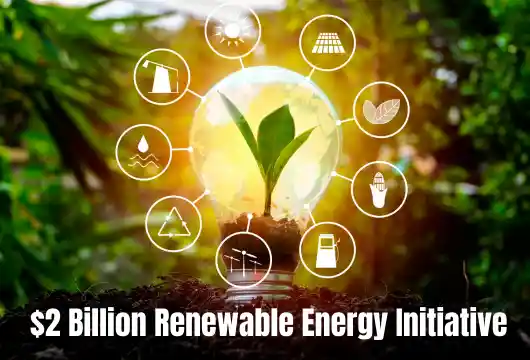A $2 billion initiative called the Europe and Central Asia Renewable Energy Scale-up (ECARES) program
The World Bank Board has approved a $2 billion initiative called the Europe and Central Asia Renewable Energy Scale-up (ECARES) program to expand renewable energy in emerging and developing economies across Europe and Central Asia. The primary objective of the ECARES program is to facilitate the addition of 15 GW of renewable energy capacity in its initial phase, equivalent to powering 650 million electric cars annually while reducing carbon emissions by 240 million metric tons. This 10-year program aims to accelerate the clean energy transition, decarbonize economies, and enhance competitiveness in global trade markets. It is also expected to attract $6 billion in private capital financing.
The inaugural project under the ECARES initiative focuses on Türkiye, supporting the country’s ambitious goal of adding 60 GW of solar and wind power by 2035. The “Accelerating the Market Transition for Distributed Energy” project, valued at $657 million, aims to expand the solar energy market and pilot distributed battery electricity storage. While Türkiye has made significant progress in renewable energy, more efforts are necessary to achieve its net-zero emissions target by 2053.
The World Bank Country Director for Türkiye, Humberto Lopez, commends Türkiye’s commitment to energy transition and emphasizes the World Bank’s support in achieving energy security, reducing energy costs, and combating climate change. The approved project aligns with broader World Bank initiatives to facilitate Türkiye’s green transformation across various sectors.
The ECARES program will adopt a multiphase programmatic approach, focusing on enabling policies, investments in electricity networks, and financing and risk mitigation instruments. Future projects under the program are slated for Armenia, Azerbaijan, Kosovo, Kyrgyz Republic, Tajikistan, Ukraine, and Uzbekistan. The initiative underscores the World Bank’s dedication to scaling up renewable energy and fostering sustainable development in the region. The World Bank Board has approved a $2 billion initiative called the Europe and Central Asia Renewable Energy Scale-up (ECARES) program to expand renewable energy in emerging and developing economies across Europe and Central Asia. The primary objective of the ECARES program is to facilitate the addition of 15 GW of renewable energy capacity in its initial phase, equivalent to powering 650 million electric cars annually while reducing carbon emissions by 240 million metric tons. This 10-year program aims to accelerate the clean energy transition, decarbonize economies, and enhance competitiveness in global trade markets. It is also expected to attract $6 billion in private capital financing.
The inaugural project under the ECARES initiative focuses on Türkiye, supporting the country’s ambitious goal of adding 60 GW of solar and wind power by 2035. The “Accelerating the Market Transition for Distributed Energy” project, valued at $657 million, aims to expand the solar energy market and pilot distributed battery electricity storage. While Türkiye has made significant progress in renewable energy, more efforts are necessary to achieve its net-zero emissions target by 2053.
The World Bank Country Director for Türkiye, Humberto Lopez, commends Türkiye’s commitment to energy transition and emphasizes the World Bank’s support in achieving energy security, reducing energy costs, and combating climate change. The approved project aligns with broader World Bank initiatives to facilitate Türkiye’s green transformation across various sectors.
The ECARES program will adopt a multiphase programmatic approach, focusing on enabling policies, investments in electricity networks, and financing and risk mitigation instruments. Future projects under the program are slated for Armenia, Azerbaijan, Kosovo, Kyrgyz Republic, Tajikistan, Ukraine, and Uzbekistan. The initiative underscores the World Bank’s dedication to scaling up renewable energy and fostering sustainable development in the region. World Bank Group Launches $2 Billion Renewable Energy Initiative for Europe and Central Asia.
The World Bank Board has approved a groundbreaking $2 billion initiative to bolster energy security and affordability by expanding renewable energy in emerging and developing economies across Europe and Central Asia. Known as the Europe and Central Asia Renewable Energy Scale-up (ECARES) program, this 10-year endeavor marks a significant milestone in the region’s clean energy transition.
Objectives and Scope of ECARES
The ECARES program seeks to facilitate the addition of 15 GW of renewable energy capacity in its initial phase, equivalent to powering 650 million electric cars annually, while simultaneously reducing carbon emissions by 240 million metric tons. By financing policies, institutional frameworks, and grid integration, the initiative aims to accelerate the clean energy transition, decarbonize economies, and enhance competitiveness in global trade markets. Moreover, it is anticipated to leverage $6 billion in private capital financing.
Türkiye’s Accelerating Transition to Renewable Energy
The inaugural project under the ECARES initiative focuses on Türkiye, supporting the country’s ambitious goal of adding 60 GW of solar and wind power by 2035. Valued at $657 million, the “Accelerating the Market Transition for Distributed Energy” project aims to expand the distributed solar energy market and pilot distributed battery electricity storage. Despite Türkiye’s progress in renewable energy, further efforts are essential to achieve its net-zero emissions target by 2053.
World Bank’s Commitment to Türkiye’s Green Transformation
Humberto Lopez, World Bank Country Director for Türkiye, applauds Türkiye’s commitment to energy transition and emphasizes the World Bank’s support in achieving energy security, reducing energy costs, and combating climate change. The approved project aligns with broader World Bank initiatives to facilitate Türkiye’s green transformation across various sectors.
ECARES Program Framework and Future Prospects
The ECARES program adopts a multiphase programmatic approach, focusing on enabling policies, investments in electricity networks, and financing and risk mitigation instruments. Future projects under the program are slated for Armenia, Azerbaijan, Kosovo, Kyrgyz Republic, Tajikistan, Ukraine, and Uzbekistan. The initiative underscores the World Bank’s dedication to scaling up renewable energy and fostering sustainable development in the region.
CLICK HERE for more inspiring climate news

